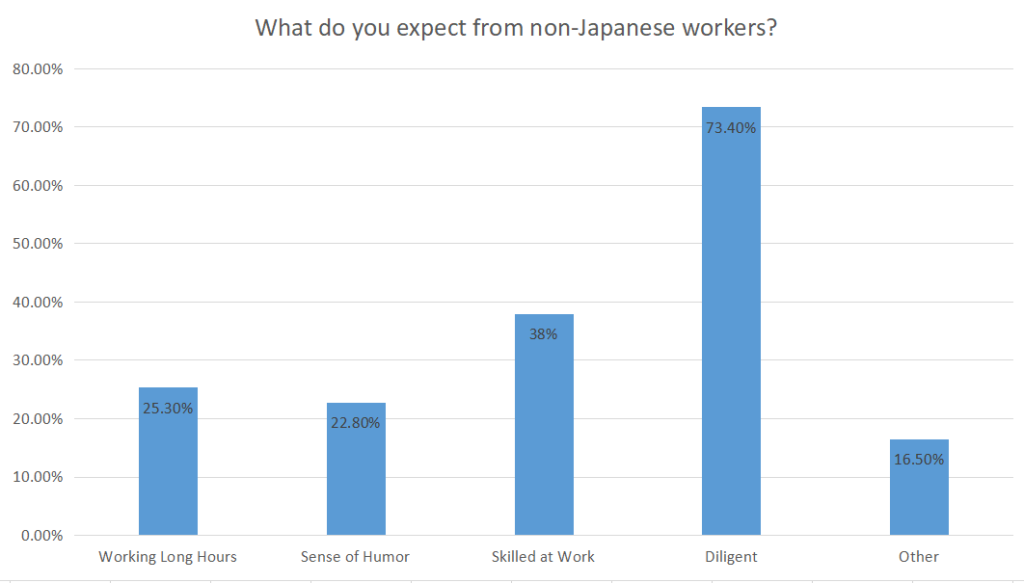10 Secrets/Rules to Get Ahead and Promoted in a Japanese Company
CONTENTS
- Secret 1: "Be Diligent"
- Secret 2: "Greeting and saying Yes!"
- Secret 3: “Nagai mononiha makarero” (be liked by those in power)
- Secret 4: "Be punctual, and never be late!"
- Secret 5: "Thoroughly implement Hōrensō"
- Secret 6: "Reading the Air (Kuuki wo yomu)"
- Secret 7: "Take the initiative and be proactive at work"
- Secret 8: "Good social skills"
- Secret 9: "Sense of humor (with self-deprecating jokes)"
- Secret 10: "Cuddling up to the person in power"
Ryoji Shimada, staff writer
As a non-Japanese, you might think, “I came to Japan as a temporary worker and was only planning to live here for a short time.” However, after living here in Japan, you found that it is safe, the city is clean, it is convenient, and there are many Japanese people who are kind and reserved. And you change your mind that “It's much easier to live here than I thought it would be, so if possible, I'd like to live here longer. If possible, I would like to bring my family here and work at my current company as long as possible.”
There are probably many non-Japanese who feel this way. In this case, the big issue is “work” or “job”. If you are self-employed and running your own store, or if you are not currently working because you are an international student, you may not need to read this article.
However, if you are currently working in a Japanese company in Japan (or abroad) and receiving a salary, you naturally think, “I want to get paid as much as possible,” “I want to get promoted and have more responsibility,” “I want to be recognized more than my colleagues and have a good relationship with my boss or seniors,” “I want to get a better evaluation than others and get more raises.” It is natural to want to be more active in your current company, right?

A company is an organization of various people.
Japanese corporate organizations are different from those in your country. There are some similarities, but there are also many differences. If you think that “if you are skilled and good at your job, you will be naturally evaluated and anyone can get ahead,” then you are naïve and you are making a big mistake. You have to decide how you want to behave according to your relationships in a Japanese company and be aware of the politics within the company.
The greater the number of workers in a company, the more complex it becomes. So here are some tips on how to do well in Japanese corporate organizations and workplaces. “How do I get my boss to like me and how do I get along with my Japanese colleagues?” If you are liked by your boss and trusted by your co-workers, you will get promoted, get paid more, and most importantly, your work will be easier and more enjoyable!
Through author's experience and various public analysis
I have worked for five Japanese companies for a total of more than 25 years: the first company has been in business for more than 100 years, the second company is a start-up and has been in business for a few years, the third company has been in business for 20 years, the fourth company has been in business for 70 years, and the fifth company has been in business for more than 150 years.
Japan has the largest number of companies in the world that are more than 100 years old. The number is more than 33,000 companies in Japan. The second largest is the United States with 19,000 companies, so Japan has by far the most long-lived companies in the world. This means that old structures and ways of thinking are still in place.
I have worked for a variety of companies from new to old. My work was overseas-related using my English skill, but the companies spanned a variety of industries. I've worked for publishers, character licensors, news agencies, business seminar company, general trading companies, and more.
In this article, I speak from personal experience, from my father who worked for a pharmaceutical company and mother who used to work for a major bank in Tokyo, from friends, and from colleagues in other companies I have met through my work. I'll also give you some data-based stories that I think are quite credible.
There are more than 4 million companies in Japan as of 2020 according to a research. Of course, there are more than 4 million companies in Japan, and I am only talking about Japanese companies in general. There are Japanese companies like those in Europe and the U.S., and there are also companies that are old-fashioned Japanese companies. There are also foreign-affiliated companies. However, as long as they are located in Japan, there must be many Japanese people working there, and it is true that many of the 10 tips apply to them in a broad sense.
If you have any comments or questions, please do not hesitate to contact us!
The first half, from 1 to 5, is the basic secrets. Be sure to follow them. Make sure you do them at all times as long as you work for a Japanese company. If you neglect even one of these, you will fail. The second half, from 6 to 10, is the advanced part. Use these techniques when you get used to the basic secrets.
Now here comes the 10 secrets to winning in the Japanese corporate world!
Secret 1: "Be Diligent"

What do you expect from a non-Japanese employee?
According to the Japan Working Holiday Association's 2019 survey of foreigners working in Japan and companies hiring foreigners, the following responses were received to the question "What do you expect from a non-Japanese employee?”

Being diligent is a key!
The results show that diligence is by far the most common trait expected of foreign workers. This diligence is not related to the actual work, such as ability, experience and skills, but more of an attitude. To work diligently and seriously means to be obedient and to do one's job without resisting the boss. In the above graph, "working long hours" has got 25%. But it is very similar to being diligent after all.
Of course you have to be able to work and be skilled at the job. But you must be already skillful, because they will not hire someone who cannot do the job. The fact that you can work in a Japanese company as a foreigner means that you are already considered to have the ability and skills to do the job.
However, even if you can do the job, you are naturally expected to be able to do it "quickly," "accurately," and "precisely." If you can do that, your evaluation will naturally be higher. In the survey above, 38% of the respondents support this. However, more than the ability, "diligence" is expected in a Japanese company. This diligent is a bit tricky. Since there is no standardized judgement, it is very difficult to tell if he/she is really diligent. Even if you are not working, make yourself seemingly busy and diligent. This is very important skillset in a Japanese company.
Secret 2: "Greeting and saying Yes!"

Greetings at work is essential!
It is very important to greet people. I think greetings are also very important in your country to make human relations smooth. It is also very important in Japan. Especially at work, it is especially important to greet your superiors and seniors in a loud and clear voice. The following is a list of common greetings used in business and the workplace.
- おはようございます!Ohayogozaimasu (Good morning!)
- ありがとうございます!Arigatogozaimasu (Thank you very much!)
- すみません Sumimasen (I'm sorry.)
- おつかれさまでした Otsukaresamadeshita (Nice work!)
- お先に失礼します!Osakinishitsureishimasu (See you!)
- はい!Hai (Yes)
Let's look at them one by one in detail.
おはようございます! If possible, say it in a loud voice, with a smile, in a cheerful voice, and while looking the person in the eye. It's even better if you say it while bowing a little. Not only at the workplace, but also when you meet someone on the way to work or in the elevator, be proactive and greet them yourself.
ありがとうございます!This is an expression that you probably hear Japanese people say often when working in a Japanese company. It is almost a set phrase to say "Arigato gozaimasu" (Thank you!) when they are talking to a customer, or when a colleague or senior does something for them. Let's make sure that you, as a foreigner, can say it properly. "Arigato" is not enough. Say "Arigato gozaimasu!" which is more polite unless you are a senior saying to your subordinate.
すみません This is an expression of apology, but you should actively use it when you have offended someone in some way or another. Many Japanese people use this expression even if it is not their fault. It's a great way to make your seniors and superiors feel good about you by putting yourself down and keeping a low profile. If you are still a new employee working in a Japanese company, try to let go of your pride.
おつかれさまでした! This expression is used when someone (like your coworkers or seniors) are leaving the office after finishing their work. It is the same as "See you tomorrow!" in English. However, you don't need to say it too loudly, just loud enough for them to hear. In some cases, they may not want to let other people know that they are leaving so soon.
お先に失礼します!This is used when you leave the office, not others. This expression is the opposite of the one above, and is used when you are leaving. However, if you are a new employee, try not to leave too early. If you leave first, you might be labeled as "not diligent enough!" Even if you are skilled enough to finish your work early, it is better to stay at the office later than your coworkers especially your boss or seniors. If you want to leave early, you can ask your boss "Is there anything that I can help or do for today?" And if they say, there is nothing for you to day, then you might leave safely without any risk to your reputation.
はい!This is not a greeting, however, it's important, so I must mention it here. When your boss or senior asks you to do something or teach you something, say "はい hai!" not "うん Um." If you simply nod your head, they may become unhappy as well.
Once I was severely reprimanded by my boss when I said "Um, um, um" instead of "hai, hai." That was when I was working for a general trading company with more than 150 years of its company history.
If you simply nod your head, the other person may become unhappy too, thinking, "Is he/she listening to me? Say, "Hai!" to show the other person that you are listening.
Secret 3: “Nagai mononiha makarero” (be liked by those in power)

Nagai Mononiha Makarero 長いものには巻かれろ Be wrapped up in something long
The next very important thing to remember to get ahead and be promoted in a Japanese company is this. There is a Japanese famous proverb that says, "長いものには巻かれろ Nagai Mononiha Makarero.” It literally means “Let yourself be wrapped up in something long.” An English proverb of “If you can’t beat them, join them” is similar. There is another similar Japanese proverb which goes, “寄らば大樹の影 Yoraba Taijyu no Kage,” which literally means, if you want to stop by, you choose the shadow of a big tree. Among English proverbs, “Look for a big tree if you want shelter,” might be similar. If you are not from an English speaking country, you might also have a similar proverb, but it basically means that "you should be obedient to those who have power."
A company is usually a large organization with many people working in it. In order for the company as a whole to perform well, a certain level of discipline is necessary. In order to maintain discipline, a hierarchical relationship is naturally created, and a pyramidal organization is formed at each level.
Recently, so called “Teal Organizations” have emerged. This is an organizational trend to make companies as flat as possible in its stratification. But in Japan, at least, this organizational structure is still very much in the minority. Even in companies that are similar to such teal organizations, there is a clear distinction between executives and employees. After all, the commander in chief and the people working under them are not completely on the same level.
In such a situation, if you join a Japanese company as a foreigner, it is unlikely that you will suddenly join the management team unless you are old enough, very experienced, and very skilled. In most cases, you will join the company as a single employee and all the people around you will be your seniors.
In this circumstance, first of all, you should be obedient to your seniors or boss and then to your superiors and their superiors' superiors and company executives. In Japanese society, “the more obedient you are, the more likely you are to be promoted up the ladder.”
I would like to ask all foreigners to keep this proverb in mind when working in a Japanese company. This is an essential skill to survive and be promoted in a Japanese company.
Secret 4: "Be punctual, and never be late!"

Never be late
Japanese people are fussy about time. The word "時間厳守, じかんげんしゅ, Jikangenshu, (punctuality)" is often used. Make sure to be on time. More specifically, act before the appointed time. In Japanese business, there is a five-minute rule. It means that when you are going to do something, you have to be ready five minutes before. For example, arriving five minutes before the meeting time, or being ready five minutes before the meeting starts.
In addition, if you are coming to work, be at work 30 minutes before the start of your work. Some coworkers may come to work more than an hour before. For example, if you are supposed to start working at 9:00 a.m., ideally you should be at your desk by 8:30.
Also, being late is strictly prohibited. If you have no choice but to be late, contact (usually calling on the phone) your supervisor or boss. If you are meeting with a client, of course let the client know in advance. Some of you may have seen Japanese people calling the company in the train or on the platform of the station when the train is late during the morning commute. You may have also seen people rushing to get to the office as fast as they can when the train is late. That shows how much Japanese people hate being late! Being late is as disgusting as committing a crime for Japanese people.
Punctuality. This is also very very important to get ahead in a Japanese company. Of course when it comes to private gathering, this rule is more relaxed.
Secret 5: "Thoroughly implement Hōrensō"

Communication with your boss is essential in Japan.
Of course, there are many ways to communicate. You can talk face to face, call, email, chat, voice message, write a memo, or use any other appropriate method. For example, a phone call is the appropriate way to contact your boss if you are running late for the meeting. Some people just use email, but a phone call is the best. If it is a daily report, email is fine. If your boss is busy or in a meeting, you can leave a voice message. If you received a call for your boss but he or she is away, it is appropriate to write a note and leave it on their desk.
For more details, please read the article on "Horenso", but the basic rule when communicating with your boss is to "put yourself in their shoes". More specifically, "make your message clear and concise," and "think about what, who, when, where, why, and how."
If you are non-Japanese, it may be difficult to communicate with them due to Japanese language problems. However, if you take the initiative to communicate with them, they will be more than happy to hear from you. Again the attitude to communicate with your boss is very important.
Up to this point, we have covered the basics. The five tips I've introduced so far can be done by almost anyone. You don't need any abilities or skills. Anyone can do them if they want to. However, the latter five tips that I'm about to share with you may be a little more difficult without a little effort. I'd like to go through them in order.
Secret 6: "Reading the Air (Kuuki wo yomu)"

Reading the air ability is essential in Japan
Manners may be difficult for non-Japanese to understand, so start by imitating your Japanese colleagues. This is based on the premise that your Japanese colleague is a person who can read the air. There are some Japanese people who cannot read the air, in this case you should not learn from them.
Also, Japanese people have a distinction between honne (true intention) and tatemae (false intention). For example, a colleague may say "Kento Shimasu (検討します)I'll consider it," but in reality the answer is "no." Or a colleague may confide in you that his boss has been power-harassing him, and when you tell the HR department about it, the colleague complains to you. In other words, it is common for Japanese people to say things like that in words, but not actually think that way.
To read the atmosphere is to grasp the true meaning of what is being said, not only by the expression of words, but also by looking at the atmosphere of the situation or the expression on the speaker's face. There is a word, "Baka Shojiki (idiot honesty)" in Japanese phrases. Baka shojiki is the complete opposite person who can read the air.
However, as a foreigner, you must have knowledge that ordinary Japanese people do not have. If you only read the air, you will not be able to show your own skills. You should proactively appeal for yourself when that is allowed or deemed useful for your work.
Secret 7: "Take the initiative and be proactive at work"

Being proactive at work is highly appreciated in a Japanese company.
Once, when my Chinese friend attended a drinking party with his Japanese colleagues, he handed out hand towels and chopsticks on the table to each seat, and poured a glass of water not only for himself but also for the others. One of my seniors was very impressed and said, "It's like my heart is being cleansed."
Also, when I was a university student, I attended a job interview. During the group interview with other university students, there were plastic bottles and cups on a large table. Two of the students noticed and proactively poured drinks for others while the others stood still and doing nothing. Those two made a good score for doing that. People who are able to take such proactive actions are highly valued in a Japanese company. Take the initiative to find an extra work and take action!
Secret 8: "Good social skills"

Socializing with your boss and seniors is considered important in a Japanese company.
It's hard to sacrifice your personal life to prioritize your company relationships, but having a good relationship is always a plus. Normally, you should be evaluated on the job, i.e. at the workplace, but the people who evaluate you are human. It is very important to have a good relationship with people in order to make the relationship go smoothly.
If you have to say no, it might be a good idea to give a reason unique to non-Japanese. For example, "My parents are coming to Japan from my home country, so it's difficult for me to come on that day," "I have to prepare for the Japanese language exam, so it's a little difficult for me tonight," or "Tomorrow night there will be a gathering of people from my home country, so it's difficult for me. Please invite me the next time!"
This kind of social skill is important even at work.
Secret 9: "Sense of humor (with self-deprecating jokes)"

Horn your sense of humor in a Japanese way.
This relates to communication, but it is good to have a sense of humor to enhance your human appeal. According to the research introduced in the Secret 1 above, 22.8% of people expect a sense of humor out of non-Japanese employees. Humor is a lubricant for conversation. However, the kind of humor that Japanese people like is "self-deprecating humor." They like self-deprecating jokes and stories. This is a bit different from a typical Western humor.
Many of you have probably seen Japanese variety shows on TV. I'm sure you have seen many comedians perform on various TV programs. Do you notice that their laughing source is usually self-deprecating? Are they the same as the comedians in your home country? I'm sure there are more differences than not.
For example, if you are fat, you might say, "I'm sorry, it's my fault this room is so hot!" Or if your hair is receding, you can say, "My hair is not receding. That's because I am moving forward!" and laugh at yourself. You can also use your home country as a source of humor by saying for example, "In my country, there are more sheep than people," or "The Japanese word 〇〇 means 〇〇 in my country's language!" For example, ブラジャー in Japanese means a female bra but in Indonesia it means "study."
This is an advanced technique since it requires a certain level of Japanese, but improving your sense of humor in a self-deprecating way will definitely give you success in a Japanese company.
Secret 10: "Cuddling up to the person in power"

Get close to the person in power who can raise you
The last secret to getting ahead in a Japanese company is to be politically savvy. When an organization is formed, a political mindset is born. In other words, there is a battle over who gets to the top, who gets to take the initiative, and who gets to hold the power.
The raison d'etre of a company is to make profits and improve society. In other words, the better the society, the more profit the company can enjoy. Society is a collection of people. If the lives of people are improved from the customer's point of view, the company will be able to increase profits to the extent of its contribution.
It is unfortunate that there are political movements within a company that are separate from the fundamental purpose of the company's existence. However, the politics is a fact of human nature that cannot be avoided. This can be seen not only in Japan but all over the world. Basically, I think it's perfectly okay for us to think the same way.
In your company, the person in power may not be the president. The president may actually be a decoration, and the person who is actually holding the power may be someone else. Even if the president is currently in power, he or she might well be gone in a year. If that is the case, the next person who becomes president will be able to raise you up if you are close to them and if they like you.
You can see this in the United States. The reason why former President Trump has so much power in the Republican Party is because there are many American people who support him. The reason why Trump is so popular in the Republican Party is because there are many people who support him. That’s so simple. If President Trump did not have the support of the voters, he would have been disregarded in the party.
As of 2021, NHK is airing a historical drama about Shibusawa Eiichi. He is said to be the father of Japanese capitalism and is famous for creating more than 500 companies. In 2024, he will be the portrait on the new 10,000 yen bill. He was born as a farmer in Saitama, north of Tokyo, but had a chance to be liked by a high-ranked official named Hiraoka Enshiro, who worked as a secretary of the next shogun, Tokugawa Yoshinobu. After Yoshinobu became the shogun (the last shogun in the Japanese history), he thought highly of Shibusawa and sent him on an overseas inspection tour to Paris as one of the delegates from Japan. He accompanied the shogun’s younger brother and traveled around Europe. After returning to Japan, he established various companies and enjoyed a prosperous life.
You may think that it is dirty to act politically, but the world has some dirty parts to begin with. There is nothing wrong with accepting this as a fact and behaving politically to some extent.
Above those are the 10 secrets to getting ahead in a Japanese company. In my 25 years of working in the Japanese corporate world, I think I have only managed to do about half of these 10 knacks or tips. If I had been able to do all ten perfectly, I would have become the president of that company. I think it is quite a challenge for you as a non-Japanese to carry out those secrets. But I believe that by practicing even a few of these things, you will dramatically improve your position in the company.

Of course, being able to work is a must.
Naturally, being good at one's job is important, and people who contribute to the company's profits, such as those who make sales or achieve good sales results, will naturally rise in the ranks. However, this is true not only in Japan, but anywhere in the world.
These 10 tips are about more than just being good at your job. In Japanese companies, if you can do your job properly, you can rise above and get ahead of those who can do more work than you by practicing the 10 tips above.
If you are a foreigner who is going to work in a Japanese company, please try to keep these 10 tips in mind. I'm sure it will bring you good results and lead to promotions and raises! I guarantee!


